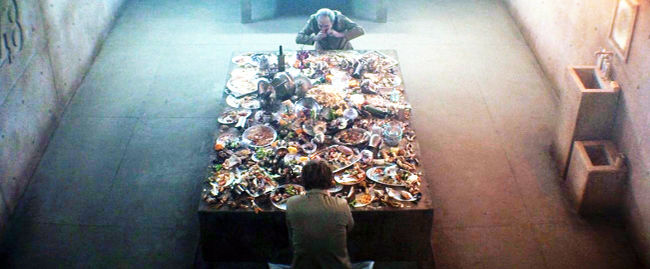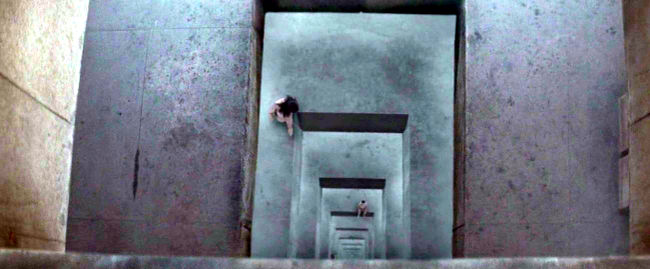El hoyo (the Platform)
El hoyo is a 2019 dystopian Spanish movie, a debut-film by Galder Gaztelu-Urrutia, which explores the tragedy of the commons in a symbolic representation of classes in society. The atmosphere strongly reminds of Cube.
![]() The movie opens with the most refined expression of one of humankind's basic needs—food—in the form of delicate gastronomy in a prestigious kitchen, with a concerned and serious maître d', making sure that only the best food is used and that its cooking is perfect. We later see him reprimand severely the staff assembled in a military fashion to respond for a tiny flaw in a pannacotta.
The movie opens with the most refined expression of one of humankind's basic needs—food—in the form of delicate gastronomy in a prestigious kitchen, with a concerned and serious maître d', making sure that only the best food is used and that its cooking is perfect. We later see him reprimand severely the staff assembled in a military fashion to respond for a tiny flaw in a pannacotta.
This, on the other hand, is the ultimate fate of the food:

The platform is a sci-fi table (not suspended by anything) covered with the food and that magically roams through cell to cell in a dystopian structure, making a pause of two minutes in each, where two inmates can feast on its content.

There is enough food for everybody. This is both stated explicitly (by the administration woman) and implicitly (the table has a serving of everybody's favourite food). Since the movie started, we know it to be of the most delicate constitution, but human nature being what it is, those at the top, that get served first, take as much as they can and leave it in an increasingly dramatic state for those below. This neat idea gives plenty of room for a deep symbolism of the class organization of society, with an obvious literal transcription of social standing as verticality (I can't shit upwards):
- Food is central: regardless of humankind's refinements and best efforts in accommodating its basic needs, the way this is actually consumed is on par with the lowest animal savagery. We are, basically, disgusting animals, however finely prepared and virgin is our pannacotta.
- It doesn't matter that some people are well-intended to the overall good. It's enough that in some stages the food gets ransacked and spoiled for the resource to become quickly disgusting and eventually worthless.
- The hero's intent to make a peaceful protest ends up in him savagely killing people differing in opinion; rebelling for a greater good typically only makes things even worse.
- People who understand the system and know how to accommodate to it turn into revulsing monsters, this is interpreted by Trimagasi.
- People who administer the system are impotent and pathetic in their attempts to make it work justly and ethically. This is interpreted by Imoguiri, whose actor is the transgender character (Agrado) in Almodovar's "Todo sobre mi madre", who contributed much to the success of this movie and who brings here a disturbing, at any rate, unwomanly look when serving as an administrator. She, however, recovers her feminine attributes when participating in the experiment.
- People who represent humankind (in the sense of Gheorghiu) oscillate between displays of humanity (compassion, empathy, assistance, support, etc.) and brutal violence at the first frustration of their feelings. This is interpreted by the main character, Goreng, for the male version and by the more mysterious Miharu, the wild woman going down the hole, for the female version. There are hints of attraction between them to highlight this relationship.
- The female cares at a primal, basic level for the child. She's ready to go without faltering to the lowest levels to rescue/find the child. The male does so at a more intellectual, distant level (the child is not even directly attributed to him, another typical theme). It takes thinking and planning for him to take action which, however, will eventually successfully find and help the child.
- The child represents innocence... She is, ultimately, "the message", meaning, the purpose, the future, hope, etc.
- There is also the theme of both friendship and racial issues, with Baharat.
One thing that is unclear is why Miharu butchers the dog of Imoguiri. I think it would have been better for the dog to accidentally go down the hole (staying on the platform when both man and administration are engrossed in attending to the woman), meeting a sorry fate at the levels below, thus illustrating both stupid accidents of life and how treasured things for some are eventually irrelevant substitutes to others.
Note: I thank Terry Serres for clarifications and comments on a previous version of the above review.
I appreciated your interpretation of this film. I want to correct the idea that Antonia San Juan (who played the VSC Administrator Imoguiri) is transgender. She is not. She played a transsexual in Pedro Almodóvar's "All About My Mother," but she is not herself transgender. You equate transgender identity (or supposed transgender identity) with impotence, which is weird. A (supposed transgender), instead of possessing qualities of both genders (in your schematization), possesses qualities of neither? In any case, your emphasis on San Juan's appearance is misguided and not in line with the actor's presentation in the film. When in her official function (interviewing Goreng), she indeed looks de-gendered, but when she enters the VSC (to better understand the system she is helping to administer) she appears more traditionally feminine, and we eventually learn that she has cancer.
The Tragedy of the Commons is not a fallacy.
Terry Serres
Mon 10/01/2022 15:38